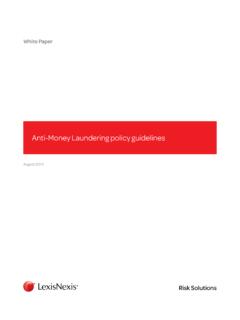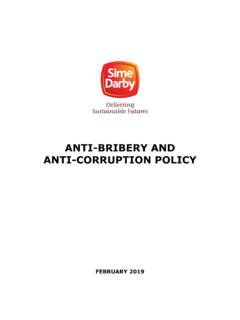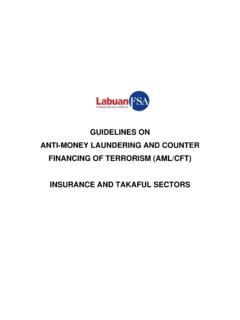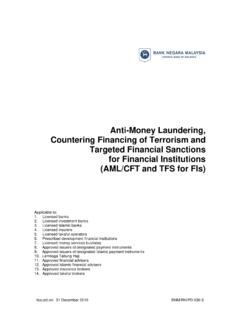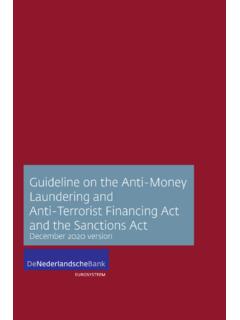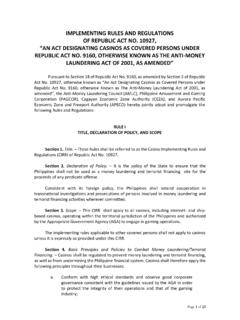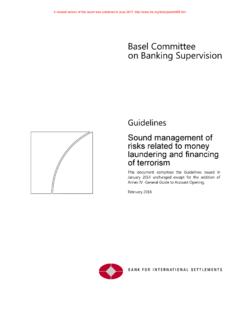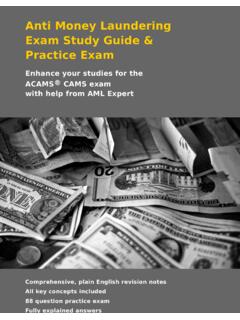Transcription of ANTI MONEY LAUNDERING POLICY and Procedures
1 anti MONEY LAUNDERING . POLICY AND Procedures . British Registered Charity 1007484. INGO License Registration No. 68/CNV-VPDA issued by Ministry of Foreign Affairs Vietnam INGO License Registration No. 1036025 issued by Ministry of Foreign Affairs Mongolia Contents APPLICATION .. 2. MISSION .. 2. PURPOSE .. 2. MONEY LAUNDERING - DEFINED .. 2. anti -TERRORISM CONSIDERATIONS .. 3. OBLIGATIONS OF ALL EMPLOYEES, TRUSTEES, VOLUNTEERS, CONSULTANTS, SECONDED AND. INTERNS .. 3. RISK FACTORS & SUSPICIOUS ACTIVITY .. 4. DONOR/PROJECT MANAGEMENT .. 5. REPORTING 5. OPERATIONAL ELEMENTS .. 6. Procedures FOR MONITORING COMPLIANCE WITH THIS 7. PROJECT COUNTRY 7. Mongolia.
2 7. Vietnam .. 8. Contact details for reporting concerns on CNCFI anti MONEY LAUNDERING POLICY .. 9. Lead: MLRO CNCF International Version Number: Version 2. Date of Approval: January 2019. Effective Date: January 2019. Review Date: January 2021. 1. APPLICATION. As a Global POLICY , this POLICY applies to: a. Christina Noble Children's Foundation International ( CNCFI ), including its headquarters in the United Kingdom and all of its country offices, regional offices, liaison offices, and any other offices operating under the name of the Christina Noble Children's Foundation. b. All National Organisations that have signed a Members' Agreement and License Agreement with CNCFI; and c.
3 All other entities that agree to be bound by the Global Policies. (together, CNCF International Entities , or may be referred to as we or us in this document). All of the CNCF International Entities shall enact their own Procedures which must be in line with global Procedures , regulations, or other regulatory documents that enable compliance by its employees, volunteers, interns, Directors (and/or, when applicable, contractors and other partners). with this Global POLICY . Where required by law or local practices, CNCF offices and Organisations may enhance the standards and requirements set out in this POLICY . MISSION. The Christina Noble Children's Foundation (CNCF) is an international partnership of people dedicated to serving the physical, medical, educational and emotional needs of vulnerable children in Vietnam and Mongolia.
4 We believe that every child is an individual who deserves love, respect and freedom from all forms of exploitation. We establish long-term relationships with the children we support and empower them to live happy, emotionally rich, and independent lives. PURPOSE. The purpose of this POLICY is to strengthen and support CNCF International (CNCFI) to enable it to realise its full potential in fund raising and importantly to ensure the integrity, survival and growth of CNCF to achieve Christina Noble's vision to help those children in need throughout the world. Through this POLICY CNCF seeks to address the challenges of a changing global financial environment and meet its obligation to promote the transparency and integrity and to recognise that public confidence in the charity's management is paramount.
5 The POLICY aims to establish best practices in an anti - MONEY LAUNDERING (AML) POLICY . The POLICY sets out CNCF's basic goal and purpose so as to permit examination of funds disbursements accordingly and maintain information on the purpose and objectives of CNCF's activities. MONEY LAUNDERING - DEFINED. MONEY LAUNDERING is the process whereby criminals introduce the proceeds of their criminal activities into a financial system through transactions that attempt to disguise the true source of the funds. In terrorism financing, funds may originate from legitimate or criminal sources. These funds are used to finance terrorist activities. Criminals and Terrorists have access to large amounts of currency.
6 However, until the currency is deposited into the banking system, their ability to utilise it is restricted. Criminals and Terrorists use charities as a means of making cash deposits knowing that they appear to legitimise (or launder) the source of the cash. CNCF is diligent in detecting and reporting suspicious activity. 2. MONEY LAUNDERING is the term used for a number of offences involving the proceeds of crime or terrorist funds. It includes possessing, or in any way dealing with, or concealing, the proceeds of any crime. The process of MONEY LAUNDERING has three stages: 1. placement, through which the funds (often in cash) enter the financial systems.
7 2. layering, by which the funds pass through a complex sequence of transactions designed to make it impossible for investigators to follow a trail of evidence back to the origin of the funds;. and 3. integration, the point at which the funds emerge from the process back into the legitimate economy in a way that they are unrecognisable as the proceeds of crime. Charities can be especially susceptible to the attentions of potential MONEY launderers. An international presence often in regions where there are serious issues in control and regulation, make them particularly attractive for use as a stage in the layering process. anti -TERRORISM CONSIDERATIONS.
8 CNCF is children's NGO, programme dependent CNCF allocates funds to partners for their exclusive use on humanitarian aid and community development activities to relieve poverty and to address the underlying causes of poverty. Terrorism, in common with other criminal acts, infringes the fundamental rights of the innocent and the powerless and diverts MONEY and attention from the real needs of the communities we are committed to helping. We do not engage with terrorist organisations or give MONEY to partners who carry out, or fund, or advocate terrorist activity. We are fully committed to ensuring all our business processes minimise the risk of funds being diverted for terrorist or any other criminal purposes.
9 We work within the law to ensure that our work and that of our partners is free from interference and that resources are used for the purposes intended. OBLIGATIONS OF ALL EMPLOYEES, TRUSTEES, VOLUNTEERS, CONSULTANTS, SECONDED AND INTERNS. Current criminal law places three obligations on all persons: 1. not to assist in the MONEY LAUNDERING process through acquiring, concealing, disguising, retaining or using the proceeds of crime 2. not to prejudice an investigation 3. not to contact any person who has been suspected of, and reported for, possible MONEY LAUNDERING in such a way as to make them aware of the suspicion or report ( tipping off ). It is important to note that the law requires all cases of suspicion to be reported, regardless of size.
10 3. RISK FACTORS & SUSPICIOUS ACTIVITY. There are a number of specific areas where CNCF International is potentially vulnerable to falling prey to MONEY LAUNDERING : The use of registered charities in MONEY LAUNDERING is well known and CNCFI recognises it must be vigilant. CNCFI is exposed to MONEY launderers in part because some organisations have a high cash turnover. CNCFI works internationally, crossing international boundaries and jurisdictions, making any audit trail difficult to follow. Due to this international dimension, the public's perception of CNCFI's integrity and the reliance in part on volunteers is attractive to a MONEY launderer because it creates opportunities to conceal funding flows.

